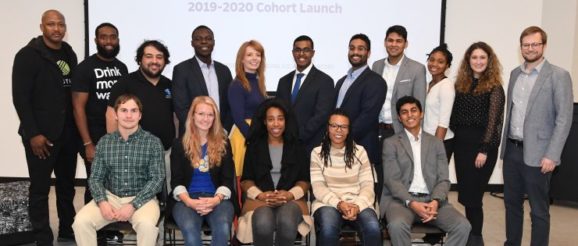Johns Hopkins Social Innovation Lab’s latest cohort teams are working on clean water, affordable housing and bees

Johns Hopkins Social Innovation Lab (SIL) kicked off a new cohort this week with teams tackling challenges in Baltimore and beyond.
The six-month program brings together social entrepreneurs from within the Johns Hopkins community and Baltimore city as a whole. They’ll partake in a curriculum and get access to funding, mentorship, office space and support. Students at MICA’s Center for Social Design and Johns Hopkins Carey Business School will work with the ventures. The idea is to bridge the teams’ commitments to mission with sustainable business models.
“I’m excited about this group because I see a lot of growth potential,” said SIL Director Alex Riehm in a statement. “While these organizations will certainly impact Baltimore, many of them have the potential to make a splash nationwide or even globally. By setting our sights high, we’ll be able to work toward some ambitious milestones this year.”
This year, the program got about 60 applications, and Riehm said 60% of the applications came from outside Johns Hopkins. In all, 10 teams were chosen — seven of which are led by entrepreneurs of color, and five of which are led by women.
Here’s a look at the teams:
Aquatas: The JHU team of Zach Schmidt Anish Mokha, Paarth Sharma and Maya Foster are creating a water purification system. We saw them pitch last year Hopkins’ FastForward U demo day.
CLLCTIVLY: Jamye Wooten founded the organization that’s mapping and funding Black-led organizations working for social change in Baltimore.
HiveLend: The startup founded by Dawn Musil and Nick Zajciw is bringing the two-sided marketplace model to connect beekeepers and farmers who need to pollinate their crops.
Infinite Focus Schools: Ashley Williams founded the startup that has a mission to help children self-regulate emotions, make responsible decisions and cultivate happy lives. The tool to get there is mindfulness and socio-emotional learning software.
Le Mondo: Carly Bales joins the cohort as a leader of the organization transforming three abandoned buildings on the west side of downtown into an artist-owned art hub multidisciplinary performance venue, neighborhood bar, artist studios, affordable apartments and a cafe.
MindStand Technologies: Michael Ogunsanya, Eric Solender and Nikita Wootten created an AI platform that monitors an organization’s internal communications to identify online harassment, hate speech, suicidality, low engagement and other troubling behaviors within an organization. It recently picked up a pitch win at Minority Innovation Weekend.
Anthony Watters leads the company’s Movement is Medicine project, which provides education around water, exercise and healthy living to prevent disease and build community in Baltimore.
Mothership: Martelle Esposito leads the venture creating a digital health community that’s providing education and training for parents and pros.
Parity: Bree Jones founded the equitable development company that acquires vacant and abandoned properties to create affordable homeownership. Jones was a winner at this year’s Give Back Hack.
PrecisionEMS: The company is looking to improve EMS preparedness and readiness with personalization and data tools.
